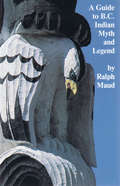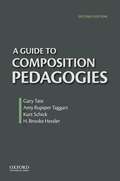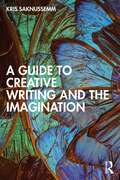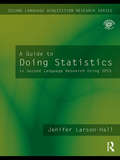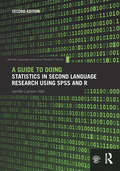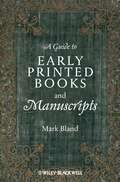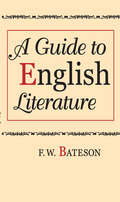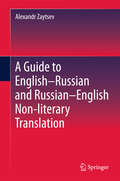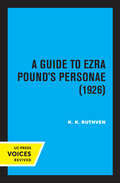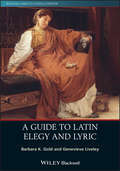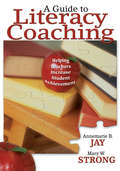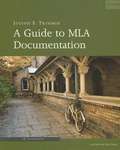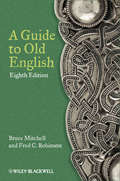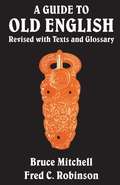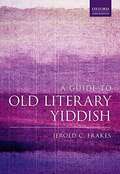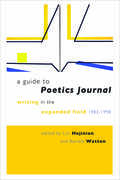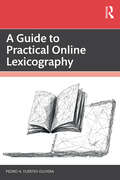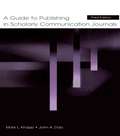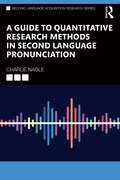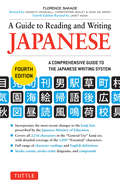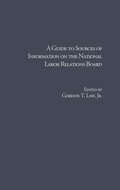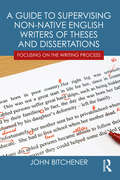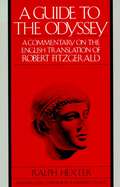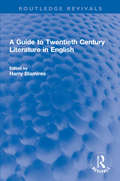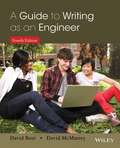- Table View
- List View
A Guide to B.C. Indian Myth and Legend
by Ralph MaudBoas, Teit, Hill-Tout, Barbeau, Swanton, Jenness, the luminaries of field research in British Columbia, are discussed herein, and their work in Indian folklore evaluated. Other scholars, amateurs, and Native informants of the past and present are given consideration, making this book a comprehensive survey of myth collecting in B.C. a valuable reference tool for beginning or advanced students of anthropology.
A Guide to Composition Pedagogies, Second Edition
by Gary Tate H. Brooke Hessler Amy Rupiper-Taggart Kurt SchickA Guide to Composition Pedagogies is the essential bibliographic guide written for newcomers to the field. Since our field has evolved quite a lot over the last decade, this long-awaited second edition contains many important changes, additions, and updates. At the same time, the practical organization and educational intent of the book have remained the same: The pedagogies themselves are categories commonly recognized in the disciplinary scholarship, and as with the first edition, each essay introduces the most important work in the field on the pedagogy, while attempting to offer readers a sense of the spirit of the approach, often through personal teaching narratives. t In short, this best-selling bibliographic guide familiarizes writing instructors with the current topography of Composition Studies and directs them to the best books and articles for further exploration. For this second edition, each author discusses some of the implications of technology for each pedagogy. In addition, the essays now focus more on practice and slightly less on theory.
A Guide to Creative Writing and the Imagination
by Kris SaknussemmTeaching creative writing for the multicultural, global, and digital generation, this volume offers a fresh approach for enhancing core writing skills in the major forms of Poetry, Fiction, Nonfiction, and Drama. A Guide to Creative Writing and the Imagination aims to provide students with organic, active learning through imitation and examples which not only emphasize writing and reading but look to other art forms for inspiration. This volume’s key features include: • Strengthening key underlying capabilities of what we mean by imagination: physical and mental alertness, clarity of perception, listening skills, attention to detail, sustained concentration, lateral thinking, and enhanced memory. • Taking direction from other art forms such as African American musical improvisation, Brancusi’s sculptural idea of “finding form,” key ideas from drawing such as foreground, background, and negative space—and some of the great lessons learned from National Geographic photography. • Incorporating techniques drawn from unusual sources such as advertising, military intelligence, ESL, working with the blind, stage magic, and oral traditions of remote indigenous cultures in Oceania and Africa. The work is intended for a global English market as a core or supplementary text at the undergraduate level and as a supporting frame at the M.F.A. level.
A Guide to Doing Statistics in Second Language Research Using SPSS
by Jenifer Larson-HallThis valuable book shows second language researchers how to use the statistical program SPSS to conduct statistical tests frequently done in SLA research. Using data sets from real SLA studies, A Guide to Doing Statistics in Second Language Research Using SPSS shows newcomers to both statistics and SPSS how to generate descriptive statistics, how to choose a statistical test, and how to conduct and interpret a variety of basic statistical tests. It covers the statistical tests that are most commonly used in second language research, including chi-square, t-tests, correlation, multiple regression, ANOVA and non-parametric analogs to these tests. The text is abundantly illustrated with graphs and tables depicting actual data sets, and exercises throughout the book help readers understand concepts (such as the difference between independent and dependent variables) and work out statistical analyses. Answers to all exercises are provided on the book’s companion website, along with sample data sets and other supplementary material.
A Guide to Doing Statistics in Second Language Research Using SPSS and R (Second Language Acquisition Research Series)
by Jenifer Larson-HallA Guide to Doing Statistics in Second Language Research Using SPSS and R, Second Edition is the only text available that demonstrates how to use SPSS and R as specifically related to applied linguistics and SLA research. This new edition is up-to-date with the most recent version of the SPSS software and now also includes coverage of R, a software program increasingly used by researchers in this field. Supported by a number of pedagogical features, including tip boxes and practice activities, and a wealth of screenshots, this book takes readers through each step of performing and understanding statistical research, covering the most commonly used tests in second language research, including t-tests, correlation, and ANOVA. A robust accompanying website covers additional tests of interest to students and researchers, taking them step-by-step through carrying out these tests themselves. In this comprehensive and hands-on volume, Jenifer Larson-Hall equips readers with a thorough understanding and the practical skills necessary to conducting and interpreting statisical research effectively using SPSS and R, ideal for graduate students and researchers in SLA, social sciences, and applied lingustics. For more information and materials, please visit www.routledge.com/cw/larson-hall.
A Guide to Early Printed Books and Manuscripts
by Mark BlandA Guide to Early Printed Books and Manuscripts provides an introduction to the language and concepts employed in bibliographical studies and textual scholarship as they pertain to early modern manuscripts and printed texts Winner, Honourable Mention for Literature, Language and Linguistics, American Publishers Prose Awards, 2010Based almost exclusively on new primary researchExplains the complex process of viewing documents as artefacts, showing readers how to describe documents properly and how to read their physical propertiesDemonstrates how to use the information gleaned as a tool for studying the transmission of literary documentsMakes clear why such matters are important and the purposes to which such information is putFeatures illustrations that are carefully chosen for their unfamiliarity in order to keep the discussion fresh
A Guide to English Literature
by F. W. BatesonAt first glance A Guide to English Literature may seem to be no more than a short bibliography of English literature with perhaps rather more extensive--and certainly more outspoken--comments on the principal editions, commentaries, biographies, and critical works than bibliographies usually provide. But it is something more: this guide contains long ""inter-chapters"" that provide reinterpretations of the principal periods of English literature in the light of modern research, as well as two final sections summarizing in unusual detail the literary criticism that exists in English and recent scholarship in the field. The purpose of this book, then, is to provide the reader with convenient access to a disciplined study of the texts themselves.This guide proposes itself as a new kind of literary history. The conventional history of literature has often tended to become a substitute for the reading of the literature it describes: the better the history, the greater the temptation to substitute it. The present combination of reading lists and inter-chapters cannot be a substitute for anything else. Meaningless as literature in themselves, they nevertheless provide the necessary preliminary information to meaningful reading. Since oddities of arrangement derive from these assumptions, the authors are not arranged alphabetically. Instead there are chronological compartments--with the divisions circa 1500, 1650, and 1800--in which authors succeed each other in the order of their births.This pioneering handbook is primarily a bibliographical laborsaving device. It is meant mostly for students and the general reader in that it stops where original research by the reader is expected to begin. However, the last chapter on literary scholarship is devoted specifically to the research specialist and provides indispensable equipment for the reader. There is also a general section on literary criticism which will be of use to all.
A Guide to English-Russian and Russian-English Non-literary Translation
by Alexandr ZaytsevLying at the intersection of translatology, cognitive science and linguistics, this brief provides a comprehensive framework for studying, investigating and teaching English-Russian/Russian-English non-literary translation. It provides a holistic perspective on the process of non-literary translation, illustrating each of its steps with carefully analyzed real-life examples. Readers will learn how to choose and process multidimensional attention units in original texts by activating different types of knowledge, as well as how to effectively devise target-language matches for them using various translation techniques. It is rounded out with handy and feasible recommendations on the structure and content of an undergraduate course in translation. The abundance of examples makes it suitable not only for use in the classroom, but also for independent study.
A Guide to Ezra Pound's Personae (1926)
by K. K. Ruthven"Both a commentary on and a critical appreciation of the work of the early Pound. It starts off with a luci introduction to Pound's technique in general, and to his imagist phase (during which the poems commented on in this book were written) in particular. In the critical passages Mr. Ruthven steers a sage middle course between the attitudes of uncritical adoration and wholesale rejection that mar so much of the literature on Pound. . . . informative without being pedantic, and exhaustive without being long-winded. . . .To turn to Mr. Ruthven's Guide is to follow in the footsteps of an intelligent, sensitive and reliable scholar." --English Studies This title is part of UC Press's Voices Revived program, which commemorates University of California Press's mission to seek out and cultivate the brightest minds and give them voice, reach, and impact. Drawing on a backlist dating to 1893, Voices Revived makes high-quality, peer-reviewed scholarship accessible once again using print-on-demand technology. This title was originally published in 1969.
A Guide to Latin Elegy and Lyric (Blackwell Guides to Classical Literature)
by Barbara K. Gold Genevieve LiveleyProvides the necessary context to read elegiac and lyric poetry, designed for novice and experienced Classics and Latin students alike A Guide to Latin Elegy and Lyric explores the language of Latin poetry while helping readers understand the socio-cultural context of the remarkable period of Roman literary history in which the poetry was composed. With an innovative approach to this important area of classical scholarship, the authors treat elegy alongside lyric as they cover topics such as the Hellenistic influences on Augustan poetry, the key figures that shaped the elegiac tradition of Rome, the motifs of militia amoris ("the warfare of love") and servitium amoris (“the slavery of love”) in Latin love elegy, and more. Organized into ten chapters, the book begins with an introduction to the literary, political, and social contexts of the Augustan Age. The next six chapters each focus on an individual lyric and elegiac poet—Catullus, Horace, Tibullus, Propertius, Ovid, and Sulpicia—followed by a survey of several lesser-known poets and post-Augustan elegy and lyric. The text concludes with a discussion of major tropes and themes in Latin elegy and lyric, and an overview and analysis of key critical approaches in current scholarship. This volume: Includes full translations alongside the Latin throughout the text to illustrate discussions Analyzes recurring themes and tropes found in Latin poetry such as sexuality and gender, politics and patronage, myth and religion, wealth and poverty, empire, madness, magic, and witchcraft Reviews modern critical approaches to elegiac and lyric poetry including autobiographical realism, psychoanalysis, narratology, reception, and decolonization Includes helpful introductory sections: "How to Read a Latin Elegiac or Lyric Poem" and "How to Teach a Latin Elegiac and Lyric Poem" Provides information about each poet, an in-depth discussion of some of their poetry, and cultural and historical background Features a dedicated chapter on Sulpicia, offering readers an ancient female viewpoint on sex and gender, politics, and patronage Part of the acclaimed Blackwell Guides to Classical Literature series, A Guide to Latin Elegy and Lyric is the perfect text for both introductory and advanced courses in Latin elegy and lyric, accessible for students reading the poetry in translation, as well as for those experienced in Latin with an interest in learning a different approach to the subject.
A Guide to Literacy Coaching: Helping Teachers Increase Student Achievement
by Annemarie B. Jay Mary W. StrongThis practical guide presents effective coaching strategies and best practices for enhancing literacy instruction, working with administrators and communities, and boosting student performance across all grade levels.
A Guide to MLA Documentation with an Appendix on APA Style
by Joseph F. TrimmerBriefer, cheaper, and easier to use than the MLA's own handbook, this popular booklet features current MLA guidelines, a new section on evaluating online sources, and an up-to-date APA appendix. The guide also provides numerous examples, a sample research paper, and helpful hints on such topics as avoiding plagiarism and taking notes.
A Guide to Old English: Revised With Texts And Glossary (Heritage Ser.)
by Bruce Mitchell Fred C. RobinsonA comprehensive introduction to Old English, combining simple, clear philology with the best literary works to provide a compelling and accessible beginners’ guide. Provides a comprehensive introduction to Old English Uses a practical approach suited to the needs of the beginning student Features selections from the greatest works of Old English literature, organized from simple to more challenging texts to keep pace with the reader Includes a discussion of Anglo-Saxon literature, history, and culture, and a bibliography directing readers to useful publications on the subject Updated throughout with new material including the first 25 lines from Beowulf with detailed annotation and an explanation of Grimm’s and Verner’s laws
A Guide to Old English: Revised with Texts and Glossary (The Royal Society of Canada Special Publications)
by Bruce Mitchell Fred RobinsonA Guide to Old English has established itself as the most thorough and most stimulating introduction to the language of Anglo-Saxon England. This revised edition adds ten basic texts, together with full notes and a comprehensive glossary, which convert the Guide into a self-contained course book for students beginning a study of Old English. The texts, such as Cynewulf and Cyneheard, the story of Caedmon and the conversion of Edwin, are those that have traditionally been chosen by teachers precisely becasue they offer the best introduction to the literature and culture of the time. They are arranged in order of increasing difficulty. The notes and glossary constantly refer to the grammatical explanations in the Guide, so that course is fully integrated and easy to follow.
A Guide to Old Literary Yiddish
by Jerold C. FrakesThis book is a comprehensive introductory manual that guides beginners to a functional reading knowledge of late medieval and early modern Yiddish (c.1100-1750). It is the first such manual to exist for that language, whose early literary tradition comprises a range of genres as broad as other contemporary European literary traditions. <p><p>The guide is organized as a series of progressively more complex lessons, focused on key texts of the literary corpus, which are presented in their authentic form as found in manuscripts and early printed books. The lessons seek to accommodate readers ranging from absolute beginners to those who might already know Hebrew, medieval German, or modern Yiddish. The focal texts are the Old Yiddish midrashic heroic lay,'Joseph the Righteous', from the earliest extant manuscript collection of Yiddish literature (1382), the Middle Yiddish romance adventure tale, 'Briyo and Zimro', from a later collection (1585), and a full canto of the Middle Yiddish epic, Pariz and Viene (1594), each with full glosses and a step-by-step introduction to the morphology, syntax, and phonology. Each lesson also includes a brief supplemental text that cumulatively demonstrates the broad cultural range of the corpus. In addition, several appendices of supplementary material round out the volume, including a collection of additional readings, a table of the manuscript hands and printing fonts employed in the volume, and a full end-glossary of all Yiddish words found in the texts.
A Guide to Poetics Journal: Writing in the Expanded Field, 1982–1998
by Lyn Hejinian Barrett WattenLyn Hejinian and Barrett Watten are internationally recognized poet/critics. Together they edited the highly influential Poetics Journal, whose ten issues, published between 1982 and 1998, contributed to the surge of interest in the practice of poetics. A Guide to Poetics Journal presents the major conversations and debates from the journal, and invites readers to expand on the critical and creative engagements they represent. In making their selections for the guide, the editors have sought to showcase a range of innovative poetics and to indicate the diversity of fields and activities with which they might be engaged. The introduction and headnotes by the editors provide historical and thematic context for the articles. The Guide is intended to be of sustained creative and classroom use, while the companion Archive of all ten issues of Poetics Journal allows users to remix, remaster, and extend its practices and debates.
A Guide to Practical Online Lexicography
by Pedro A. Fuertes-OliveraA Guide to Practical Online Lexicography provides a step-by-step course on digital lexicography, discussing state-of-the-art theoretical lexicography and offering a guide to practical lexicography, with a focus on monolingual online dictionaries.Dictionaries today need to be designed and made for online environments, use up-to-date technologies in all aspects of lexicography, and have adequate business models in place for financing them. This book:• Covers lexicographic data and categories of existing online dictionaries, and shows how to plan, analyse, and store data.• Discusses the relationship between technology, dictionary users and dictionary makers, lexicographic developments, and economic costs.• Provides an in-depth case study of designing and making the Diccionario Digital del Español (DIDES), an online dictionary of Spanish edited by the author.• Includes further reading recommendations, practical activities, and questions for discussion at the end of each chapter.Drawing on materials developed by the author from his experience of over 20 years of lecturing in universities and institutions globally, this is a practical go-to guide to online lexicography for students of lexicography, e-lexicographers and researchers.
A Guide to Publishing in Scholarly Communication Journals (Published for the International Communication Association)
by John A. Daly Mark L. KnappThis guide offers detailed advice on the journal article publication process, describing each step of the process and providing insights for improving the presentation of work intended for publication in communication journals. It includes advice from journal editors across the discipline and offers resource materials to help both new and seasoned writers publish their work. The guide begins with an overview of the publication process, followed by a discussion of each step of the manuscript submission, review, and revision processes. In addition to reality-based answers to questions often posed to editors, resource materials are provided in the appendices, introducing readers to the various forms and correspondence they will encounter when they submit their work for consideration. The guide focuses on the issues and procedures associated with the publication process, examining rules and expectations encountered during the publishing process that are often assumed to be known but are rarely articulated. The guidance provided here will aid in establishing consistency in publication practices and will contribute toward improving the quality of journal submissions, as well as enhancing interaction with editors and reviewers. As a guide to demystifying procedures associated with the publication process, this resource will serve all academic authors desiring to publish their work in scholarly communication journals.
A Guide to Quantitative Research Methods in Second Language Pronunciation (ISSN)
by Charlie NagleThis book offers a comprehensive resource on the state-of-the-art in L2 pronunciation, surveying the most up-to-date theoretical and methodological developments to highlight the multidimensional nature of pronunciation scholarship and directions for future research. The volume examines both speech perception and production, including the perception-production link. The book explores production from a range of perspectives, including acoustic analysis of specific features and listener-based ratings of global dimensions of pronunciation. Each chapter spotlights a different dimension of pronunciation through a consistent structure, including a summary of the latest research, a critical appraisal of methods, and an overview of data analysis procedures with recommendations for practical implementation. The innovative interconnected structure allows readers to build on their knowledge with each successive chapter while also allowing the flexibility to use chapters as standalone units depending on individual interests. A concluding chapter outlines a research agenda for future scholarship, spotlighting the methods and approaches that are most likely to advance the field. This book is an invaluable resource for graduate students and researchers, at all stages of their careers, looking to expand their knowledge base in SLA and L2 pronunciation and related fields such as phonetics and phonology.
A Guide to Reading and Writing Japanese
by Janet Ikeda Kenneth Henshall Christopher Seeley Henk De GrootThis is an essential study tool for students seeking to learn Japanese and dramatically improve their kanji and kana. Students have been reading and writing Japanese for centuries, and they build their knowledge most successfully when they rely on a trusted resource. Today's most trusted-and readily available-resource is A Guide to Reading and Writing Japanese. This classic, best-selling learning and reference work, trusted by beginning and intermediate students learning Japanese since 1959, is now being offered as a fourth edition and is thoroughly revised and up-to-date. Having a knowledge of the full set of General Use characters, which this guide includes, will allow reading of any Japanese newspaper with ease and confidence. Key features on this revised edition include: The most recent changes prescribed by the Japanese Ministry of Education. Covers all the 2,136 characters in the 'General Use' / Joyo Kanji set. Detailing coverage of the 1,009 'Essential' Japanese characters arranged by grade for children in the first six years of grade school. The Kanji characters based more on their frequency in everyday language than the complexity of their composition.
A Guide to Sources of Information on the National Labor Relations Board (Research and Information Guides in Business, Industry and Economic Institutions)
by Gordon T. Law M. P. CatherwoodA concise history of the board in the U.S. from its inception in 1935, including an overview of current case law, and a bibliographic essay of selected secondary literature about the board.
A Guide to Supervising Non-native English Writers of Theses and Dissertations: Focusing on the Writing Process
by John BitchenerFocused on the writing process, A Guide to Supervising Non-native English Writers of Theses and Dissertations presents approaches that can be employed by supervisors to help address the writing issues or difficulties that may emerge during the provisional and confirmation phases of the thesis/dissertation journey. Pre-writing advice and post-writing feedback that can be given to students are explained and illustrated. A growing number of students who are non-native speakers of English are enrolled in Masters and PhD programmes at universities across the world where English is the language of communication. These students often encounter difficulties when writing a thesis or dissertation in English – primarily, understanding the requirements and expectations of the new academic context and the conventions of academic writing. Designed for easy use by supervisors, this concise guide focuses specifically on the relationship between reading for and preparing to write the various part-genres or chapters; the creation of argument; making and evaluating claims, judgements and conclusions; writing coherent and cohesive text; meeting the generic and discipline-specific writing conventions; designing conference abstracts and PowerPoint presentations; and writing journal articles.
A Guide to The Odyssey: A Commentary on the English Translation of Robert Fitzgerald
by Ralph HexterFor those of us who know and love the incomparable Odyssey of Homer (and there are many), Dr. Hexter has created a valuable, detailed analysis, taking into account many of Homer's most fascinating subtleties.
A Guide to Twentieth Century Literature in English (Routledge Revivals)
by Harry BlamiresFirst published in 1983, A Guide to Twentieth Century Literature in English is a detailed and comprehensive guide containing over 500 entries on individual writers from countries including Africa, Australia, Canada, the Caribbean, India, Ireland, New Zealand, Pakistan, Sri Lanka, and the UK. The book contains substantial articles relating to major novelists, poets, and dramatists of the age, as well as a wealth of information on the work of lesser-known writers and the part they have played in cultural history. It focuses in detail on the character and quality of the literature itself, highlighting what is distinctive in the work of the writers being discussed and providing key biographical and contextual details. A Guide to Twentieth Century Literature in English is ideal for those with an interest in the twentieth century literary scene and the history of literature more broadly.
A Guide to Writing as an Engineer
by David Mcmurrey David BeerWritten for engineers, this book provides more than technical know-how and focuses on how to be an effective communicator. This new edition helps to eliminate the glitches that trip up the busy reader or listener, causing annoyance, confusion, or misunderstanding'so that their writing and speech are crystal clear. This text also focuses on the technical writing and speaking issues encountered in day to day work, writing reports, business letter, memoranda, proposals, emails, presentations, and more. The new edition includes new coverage of social media, including coverage of popular forms, best practices, dangers and ethics of using social media, and expanded coverage of informal communication.
